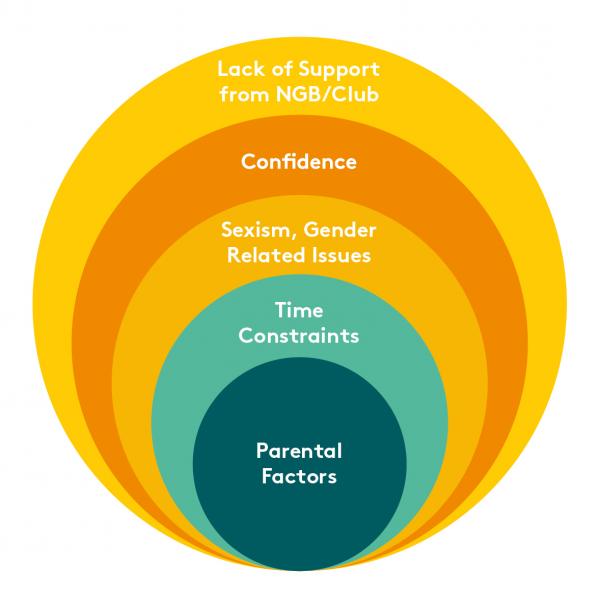Barriers and Challenges
In March 2021, Sport Ireland released its first report on Women in Sport Coaching Research. This report summarised analysis from the Sport Ireland ‘Women in Coaching’ survey and the follow-on focus group discussions in December 2020. The research looked to understand barriers and challenges females face in coaching.
It is highly recommended that anyone reading this toolkit make themselves familiar with the Sport Ireland Women in Coaching Report and the information contained in it. Sports should look to address these barriers if they are to develop gender equality when it comes to coaching in their sport.
The following outlines the top five barriers or challenges stated by women coaches in Ireland from this research.
Lack of Support from NGB/Club
Challenges within the club, Negative coaching environments, Felt undervalued, Lack of training venues, Male dominated, Volunteer shortage, Lack of respect and support.
Confidence
In their ability, In their knowledge, In standing up to parents, Low condence to address male management.
Sexism, Gender Related Issues
Male parents, Other male coaches, Male club administrators, Bullying, Seen as less knowledgeable, Overlooked by peers, Being taken seriously as a female, Disrespected, Stigma, Having to prove yourself, Athletes question experience.
Time Constraints
Personal balancing, Management of time, Work/ family commitments, Own training versus coaching.
Parental Factors
Unrealistic expectations from parents on the coaches, Use sport as a babysitting service,Wanting/demanding more from the coach, Difficult to deal with.
Women coaches – no matter where they coach – face a multi-level and complex set of barriers, and depending on their intersectional identities, they may face layered oppression and marginalization
It is important for sports to understand what barriers and challenges women coaches face in their sports in order for them to see what measures need to be taken to appropriately recruit, develop and retain them. Sports should speak to women that have dropped out of coaching to understand why they stopped and what your sport could have done differently to retain them.
By using the suggested actions and helpful documents from this toolkit, you will have discovered ways to overcome or address the barriers and challenges that females experience in coaching and have a clear idea of resources and contacts to call upon for more in-depth knowledge and a clear pathway to create solutions.
